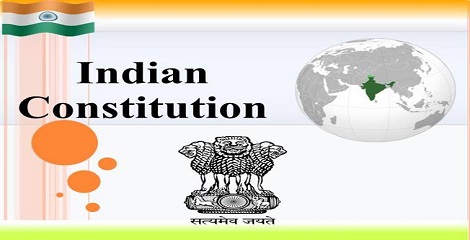INDIAN CONSTITUTION PART IV
Hello Candidates Welcome to the GK Section of the Affairscloud.com. This article is the continuation of the Indian Constitution Part IV.
- Click Here to Read Indian Constitution
- Click Here to Attend Indian Constitution Quiz
Click Here to Attend Indian Constitution IV Quiz
PART XVII : OFFICIAL LANGUAGE (343 – 351)
Article | Importance |
CHAPTER I : LANGUAGE OF THE UNION | |
| 343 | Official language of the Union. |
| 344 | Commission and Committee of Parliament on official language. |
CHAPTER II : REGIONAL LANGUAGES | |
| 345 | Official language or languages of a State. |
| 346 | Official language for communication between one State and another or between a State and the Union. |
| 347 | Special provision relating to language spoken by a section of the population of a State. |
CHAPTER III : LANGUAGE OF THE SUPREME COURT, HIGH COURTS, ETC. | |
| 348. | Language to be used in the Supreme Court and in the High Courts and for Acts, Bills, etc |
| 349 | Special procedure for enactment of certain laws relating to language. |
CHAPTER IV : SPECIAL DIRECTIVES | |
| 350 | Language to be used in representations for redress of grievances. |
| 350A | Facilities for instruction in mother-tongue at primary stage. |
| 350B | Special Officer for linguistic minorities. |
351 | Directive for development of the Hindi language. |
PART XVIII : EMERGENCY PROVISIONS(352 – 360)
Article | Importance |
352 | Proclamation of Emergency. |
| 353 | Effect of Proclamation of Emergency. |
| 354. | Application of provisions relating to distribution of revenues while a Proclamation of Emergency is in operation |
| 355 | Duty of the Union to protect States against external aggression and internal disturbance. |
356 | Provisions in case of failure of constitutional machinery in States. |
| 357 | Exercise of legislative powers under Proclamation issued under article 356. |
| 358 | Suspension of provisions of article 19 during emergencies. |
| 359. | Suspension of the enforcement of the rights conferred by Part III during emergencies |
| 359A | Repealed |
360 | Provisions as to financial emergency. |
PART XIX : MISCELLANEOUS(361 – 367)
Article | Importance |
361 | Protection of President and Governors and Rajpramukh. |
| 361A | Protection of publication of proceedings of Parliament and State Legislatures. |
| 361B | Disqualification for appointment on remunerative political post. |
| 362 | Repealed |
| 363 | Bar to interference by courts in disputes arising out of certain treaties, agreements, etc. |
| 363A | Recognition granted to Rulers of Indian States to cease and privy purses to be abolished. |
| 364 | Special provisions as to major ports and aerodromes. |
| 365 | Effect of failure to comply with, or to give effect to, directions given by the Union. |
| 366 | Definitions. |
| 367 | Interpretation. |
PART XX : AMENDMENT OF THE CONSTITUTION (368)
Article | Importance |
368 | Power of Parliament to amend the Constitution and procedure therefor. |
PART XXI : TEMPORARY, TRANSITIONAL AND SPECIAL PROVISIONS(369 – 392)
Article | Importance |
| 369 | Temporary power to Parliament to make laws with respect to certain matters in the State List as if they were matters in the Concurrent List. |
370 | Temporary provisions with respect to the State of Jammu and Kashmir. |
| 371 | Special provision with respect to the States of Maharashtra and Gujarat. |
371A | Special provision with respect to the State of Nagaland. |
| 371B. | Special provision with respect to the State of Assam |
| 371C | Special provision with respect to the State of Manipur. |
| 371D | Special provisions with respect to the State of Andhra Pradesh. |
| 371E | Establishment of Central University in Andhra Pradesh. |
| 371F | Special provisions with respect to the State of Sikkim. |
| 371G | Special provision with respect to the State of Mizoram. |
| 371H | Special provision with respect to the State of Arunachal Pradesh. |
| 371-I | Special provision with respect to the State of Goa. |
| 372. | Continuance in force of existing laws and their adaptation |
| 372A | Power of the President to adapt laws. |
| 373 | Power of President to make order in respect of persons under preventive detention in certain cases. |
| 374 | Provisions as to Judges of the Federal Court and proceedings pending in the Federal Court or before His Majesty in Council. |
| 375 | Courts, authorities and officers to continue to function subject to the provisions of the Constitution. |
| 376 | Provisions as to Judges of High Courts. |
| 377 | Provisions as to Comptroller and Auditor-General of India. |
| 378 | Provisions as to Public Service Commissions. |
| 378A | Special provision as to duration of Andhra Pradesh Legislative Assembly. |
| 379-391 | Repealed |
| 392 | Power of the President to remove difficulties. |
PART XXII : SHORT TITLE, COMMENCEMENT, AUTHORITATIVE TEXT IN HINDI AND REPEALS (393 – 395)
Article | Importance |
393 | Short title |
| 394 | Commencement |
| 394A | Authoritative text in the Hindi language. |
| 395 | Repeals. |
SCHEDULES
Schedules are lists in the Constitution that categorize and tabulate bureaucratic activity and policy of the Government.Indian Constitution originally had eight schedules.Four more schedules were added by different amendments, now making a total tally of twelve.
Schedules | Description |
First Schedule | I – The States. II. – The Union territories. |
Second Schedule | PART A – Provisions as to the President and the Governors of States. PART B – Repealed PART C – Provisions as to the Speaker and the Deputy Speaker of the House of the People and the Chairman and the Deputy Chairman of the Council of States and the Speaker and the Deputy Speaker of the Legislative Assembly and the Chairman and the Deputy Chairman of the Legislative Council of a State PART D – Provisions as to the Judges of the Supreme Court and of the High Courts. PART E – Provisions as to the Comptroller and Auditor-General of India. |
Third Schedule | Forms of Oaths or Affirmations. |
Fourth Schedule | Allocation of seats in the Council of States. |
Fifth Schedule | Provisions as to the Administration and Control of Scheduled Areas and Scheduled Tribes PART A – General. |
Sixth Schedule | Provisions as to the Administration of Tribal Areas in the States of Assam, Meghalaya, Tripura and Mizoram. |
Seventh Schedule
| List I – Union List. List II – State List. List III – Concurrent List. |
Eighth Schedule | List of Recognised Languages |
Ninth Schedule | Validation of certain Acts and Regulations. |
Tenth Schedule | Provisions as to disqualification on ground of defection. |
Eleventh Schedule | Powers, authority and responsibilities of Panchayats. |
Twelfth Schedule | Powers, authority and responsibilities of Municipalities, etc. |
BORROWED FEATURES OF INDIAN CONSTITUTION
The given below are the borrowed features of Indian Constitution from other countries :
From U.K.
- Nominal Head – President (like Queen)
- Cabinet System of Ministers
- Post of PM
- Parliamentary Type of Govt.
- Bicameral Parliament
- Lower House more powerful
- Council of Ministers responsible to Lowe House
- Speaker in Lok Sabha
From U.S.
- Written Constitution
- Executive head of state known as President and his being the Supreme Commander of the Armed Forces
- Vice- President as the ex-officio Chairman of Rajya Sabha
- Fundamental Rights
- Supreme Court
- Provision of States
- Independence of Judiciary and judicial review
- Preamble
- Removal of Supreme court and High court Judges
From USSR
- Fundamental Duties
- Five year Plan
From AUSTRALIA
- Concurrent list
- Language of the preamble
- Provision regarding trade, commerce and intercourse
From JAPAN
- Law on which the Supreme Court function
From WEIMAR CONSTITUTION OF GERMANY
- Suspension of Fundamental Rights during the emergency
From CANADA
- Scheme of federation with a strong centre
- Distribution of powers between centre and the states and placing. Residuary Powers with the centre
From IRELAND
- Concept of Directive Principles of State’s Policy(Ireland borrowed it from SPAIN)
- Method of election of President
- Nomination of members in the Rajya Sabha by the President
From SOUTH AFRICA
- Amendment Of the Indian Constitution
AffairsCloud Recommends Oliveboard Mock Test
AffairsCloud Ebook - Support Us to Grow
Govt Jobs by Category
Bank Jobs Notification





